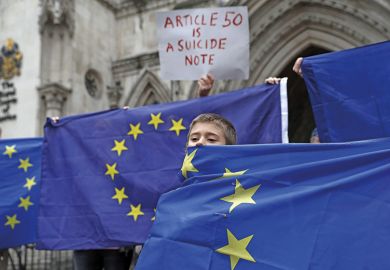We are expecting to see negotiators pull up a chair at the Brexit table to discuss research in the autumn at the earliest. On paper, the UK has two main options when it comes to whether scientists will retain access to the European Commission’s research funding programmes after the country leaves the European Union.
It either becomes an associated member of the framework programmes – paying into the pot so that its researchers can apply for funding but having no say over how the framework programme is structured or funded. Or it goes it alone, losing access to the funding and potentially setting up its own collaborative funding schemes to replace them.
But, in reality, as Brexit talks unfold, decisions in seemingly unrelated areas could have huge ramifications that may well dictate the deals that negotiators can make in terms of research.
One of these is in relation to the free movement of people. This is one of the core principles of the EU and one of the things that the UK government is determined to clamp down on with Brexit. Since the government appears unwilling to accept this requirement, many think that access to the framework programmes is doomed.
Another is the jurisdiction of the European Court of Justice. Countries associated with the framework programme must agree to let the ECJ settle any disputes that arise in relation its funding. So Theresa May’s stringent opposition to the ECJ’s having any remit in the UK after Brexit could scupper the UK’s chance of becoming an associated country.
Despite all this, there is a glimmer of hope, as the countries that are associated with the framework programme have varying deals with the EU in terms of the free movement of people. But, in order to secure an agreement that could work to the advantage of the UK’s researchers, the political will has to be there.
If the UK leaves the framework programme, its academics may still be able to work on EU-funded grants but not secure them personally as part of a “third country” set-up. Researchers would also have the option to apply for European Research Council grants, but they would have to conduct the research in a European country, or one with associated status, for half the term of the grant if they were to secure it.
Setting up the UK’s own version of the funding schemes that the Commission offers, with the money saved by its contributions to the research pot, is another option.
The UK gets far more research funding back from the EU than it puts into the pot, making this seem like a bad bet compared with staying in. But it does have its merits. The UK would be able to design a scheme that aligned with its own research strengths and priorities, rather than be constrained by the directions the European Commission dictates for research.
Setting up such a scheme in time for the end of the existing framework programme in 2020 seems like a tough ask. Indeed, the Swiss have tried to do this previously and ended up coming back to the framework programme.
Whichever road the negotiators end up taking, it is going to be a long and complicated one, and the only certainty appears to be that UK science is set to lose out.
Register to continue
Why register?
- Registration is free and only takes a moment
- Once registered, you can read 3 articles a month
- Sign up for our newsletter
Subscribe
Or subscribe for unlimited access to:
- Unlimited access to news, views, insights & reviews
- Digital editions
- Digital access to THE’s university and college rankings analysis
Already registered or a current subscriber?








